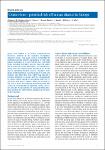Usutu virus – potential risk of human disease in Europe
Vázquez, A.
Jiménez-Clavero, M. A.
Franco, Leticia
Mantke, Oliver Donoso
Sambri, V.
Niedrig, Matthias
Zeller, Hervé
Tenorio, Antonio
Usutu virus (USUV) is an African mosquito-borne flavivirus, member of the Japanese encephalitis antigenic group. This avian virus is transmitted by arthropod vectors (mainly mosquitoes of the Culex pipiens complex). It is well known that free-living birds, including migratory species, have the potential to disperse certain pathogenic microorganisms. Usutu virus has recently been introduced to Europe and is spreading through Austria, Hungary, Italy, Spain and Switzerland, causing disease in birds and humans. Like West Nile virus, USUV may become a resident pathogen in Europe and the consequences for public health should be considered. Many different biotic and abiotic factors affect the survival of the virus in a new environment and influence the efficiency of its geographical dispersal. In this article, we consider the possibility of including USUV infections among the vector-borne diseases to be monitored in Europe.
No license information
Related Items
Show related Items with similar Title, Author, Creator or Subject.
-
2015-03-13ZeitschriftenartikelSpot the Difference - Development of a Syndrome Based Protein Microarray for Specific Serological Detection of Multiple Flavivirus Infections in Travelers Cleton, Natalie B.; Godeke, Gert-Jan; Reimerink, Johan; Beersma, Mathias F.; Doorn, H. Rogier van; Franco, Leticia; Goeijenbier, Marco; Jimenez-Clavero, Miguel A.; Johnson, Barbara W.; Niedrig, Matthias; Papa, Anna; Sambri, Vittorio; Tami, Adriana; Velasco-Salas, Zoraida I.; Koopmans, Marion P. G.; Reusken, Chantal B. E. M.Background: The family Flaviviridae, genus Flavivirus, holds many of the world’s most prevalent arboviral diseases that are also considered the most important travel related arboviral infections. In most cases, flavivirus ...
-
2017-03-20ZeitschriftenartikelCo-circulation of West Nile virus and distinct insect-specific flaviviruses in Turkey Ergünay, Koray; Litzba, Nadine; Brinkmann, Annika; Günay, Filiz; Sarıkaya, Yasemen; Kar, Sırrı; Örsten, Serra; Öter, Kerem; Domingo, Cristina; Kasap, Özge Erisoz; Özkul, Aykut; Mitchell, Luke; Nitsche, Andreas; Alten, Bülent; Linton, Yvonne-MarieBackground: Active vector surveillance provides an efficient tool for monitoring the presence or spread of emerging or re-emerging vector-borne viruses. This study was undertaken to investigate the circulation of ...
-
2011-09-29ZeitschriftenartikelTick-borne encephalitis in Europe, 2007 to 2009 Mantke, Oliver Donoso; Escadafal, Camille; Niedrig, Matthias; Pfeffer, M.As a follow-up of a retrospective survey on tick borneencephalitis (TBE) in 2008, the European Network for Diagnostics of “Imported” Viral Diseases launched a new survey in 2010, to collect broader information on TBE ...

